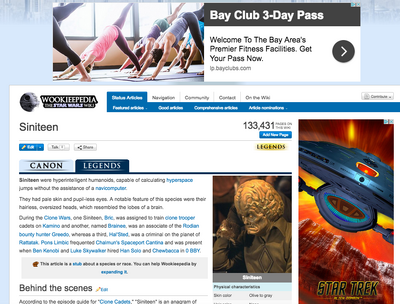- FANDOM has two main types of ads.
- Programmatic ads are placed throughout a page and sold from ad exchanges.
- Direct ads are bigger, but used less frequently on the page, and are sold directly by FANDOM to advertisers.
- Advertisers value viewability and relevance.
- Visitors value ads that don't impact their FANDOM experience.
- FANDOM removes any programmatic ads that hurt the user experience.
- FANDOM will not work with an ad exchange that does not value the user experience.
- FANDOM values quality ads over the quantity of ads.
- We have been removing programmatic ads in favor of fewer but more high-impact direct ads.
- These improve the overall performance of the page and are key to FANDOM's success.
- FANDOM has begun using high-value Featured Videos for advertisements in order to remove ad clutter.
- We have also revamped the page and article headers for a more attractive looking site for users and advertisers.
- We have started running ad tests that remove ad clutter.
- What questions do you have about advertisements on Fandom powered by Wikia? Read this blog (Part 1 of 3) and then share your questions in the comments!
Advertisements. We all have a lot of feelings on those. They're a big part of the internet, and they're how companies like Fandom are able to make money to support the site. We haven't talked to you about advertisements that much in the past, so we're giving you a big look into advertisements on Fandom this week. In our first two blog posts, we'll talk about why we have ads—we're an ad-supported business, enabling us to operate and continually improve the largest entertainment fan site in the world, free of charge to you—as well as what types of ads we have on the site. In our third and final post, we're going to discuss the future of ads on Fandom and how we want to make the ad experience better for you and your readers.
The State of Ads on Fandom[]
Let's cut right to the chase—the advertisement experience on Fandom should be a lot better. Like many for-profit sites on the internet, there has been an increase in the number of ads on a page. With this, the balance of ad content versus site content has become somewhat skewed. This can seem overwhelming for a logged out user. You know that. We know that too. That's one of the reasons for this blog series: to let you know that we see what you see, and how we are going to improve this in 2017.
Before we get into those commitments, though, it will be helpful to define some terms and concepts that will be used throughout these blog posts. That way, you know the basics about how advertisements work on Fandom.
Types of Ads: Programmatic[]
Programmatic ads are the ones that people tend to think of first, for two big reasons. The first is because these ads are commonly used across the internet. The second is that their quality varies from good/relevant to just plainly bad or irrelevant. They are sold indirectly, meaning our sales team does not directly work with the companies behind the ads, and are sent to us through our ad exchange partners. These exchanges include thousands of ad buyers who purchase inventory from all over the world.

Example of programmatic ads on a wiki page. Note that they are on two different subjects and not necessarily relevant to the readers of the wiki.
Programmatic ads represent an entire industry focused on determining what advertising content (also called ad units) goes on what website. Over time, they have also adopted the strategy of learning as much as possible about individual web users and their computers, using methods like cookies. This helps the exchanges display ads that are (at least in theory) more relevant to an individual user’s interests and habits.
Ad exchanges dictate the most common sizes, shapes and placements of programmatic ads on websites. This is why you see the same ads displayed in the same places, no matter which site you might visit. And since the exchanges tend to know at least a little something about you specifically, this makes it even more likely that the same exact ads will follow you around in your web travels. If you are someone who routinely blocks or deletes cookies and other identifying information, you will likely find the relevance (and often the quality) of programmatic ads to be very low. After all, if the exchange doesn't know anything about you, then it's going to send you random ads. That's not a great experience.
On a per-ad basis, programmatic ads don't generate a lot of revenue for any individual site, which is part of the reason why their numbers have increased across the web. Fandom’s goal moving forward is to reduce the number of programmatic ads and to reduce the number of different ad exchanges that are used. We're also in a great position to get rid of ad exchanges that abuse the system or send low-quality ads, which we'll talk about more in our next blog.
Types of Ads: Direct[]
Direct ads are called that because their presence on Fandom is the result of our sales teams working directly with companies or their representatives. Direct ads are collaborative efforts, often created by designers who work for Fandom, and are more tailored to Fandom’s readers. They tend to be larger, and will often span multiple ad units on a single page.

This ad was sold directly, so advertisers are paying to directly reach the audience of the wiki. It's a great-looking ad that lets you engage with it (note the Video Play button).
Directly sold ads are consistently of higher quality and relevance to Fandom readers and community members, especially when compared to programmatic ads. In general, direct ads create a more pleasant and, hopefully, a more interesting advertising experience. Direct ads also make a lot more money for Fandom, which means that, with more direct ads, there can be fewer ads per page. Our goal is to rely more on direct ads to support Fandom's growth, a goal we have been steadily working on for the last few years.
What Matters to Advertisers[]
In recent years, as both web users and the web have evolved, viewability—the amount of time a user might have an ad on their screen—has become the basis for judging an ad’s success. Click-through rate (or “CTR”) still matters, but not to the degree it once did. This shift is somewhat new, and many web publishers are still adapting to it.
Relevance is the other key factor for companies who pay for ad space. They want to reach the people most likely to be interested in what they are selling. On Fandom, this often means you’ll see direct ads for video games and other visual entertainment. But you’ll also see ads for things like cars, technology, and food. Advertisers know that Fandom readers and editors are entertainment experts and smart consumers, so they are eager to stand out to those people.
What Matters to Visitors[]
Most web users expect to see some amount of advertising when they are on a free-to-use site like Fandom. Ads have been part of mass media for centuries, dating back to the first newspapers and magazines, through radio and television. Internet publishing is no different in that respect. Like in those other mediums, if the balance starts to feel too skewed—that is, if ads start to take over too much of the time or space from the primary content—it degrades the overall experience. The end result is that readers and viewers will start looking for ways to avoid ads, or they will simply go elsewhere to find the content they want.
The technical performance of ads also matters a great deal. Ads with animation, video, or interactive elements are outstanding concepts in the ad world, and our teams make sure that the design and functionality of these ads are balanced with the need for loading speed and content visibility. Some ads also collect data about viewers and their interactions. These aspects are important to making ads work well, but, in some cases, they can also negatively impact the overall experience.
Viewability, relevance, balance, and performance are the key topics we covered. Do you have any questions about this, or how ads work in general? We'll be taking a deeper dive into ads in our next two blogs this week, but in the meantime please share your questions in the comments!
Click here to follow the Fandom staff blog.
Click here to sign up for the From the Desk of Community email newsletter.
Join our Official Discord server for registered editors!

